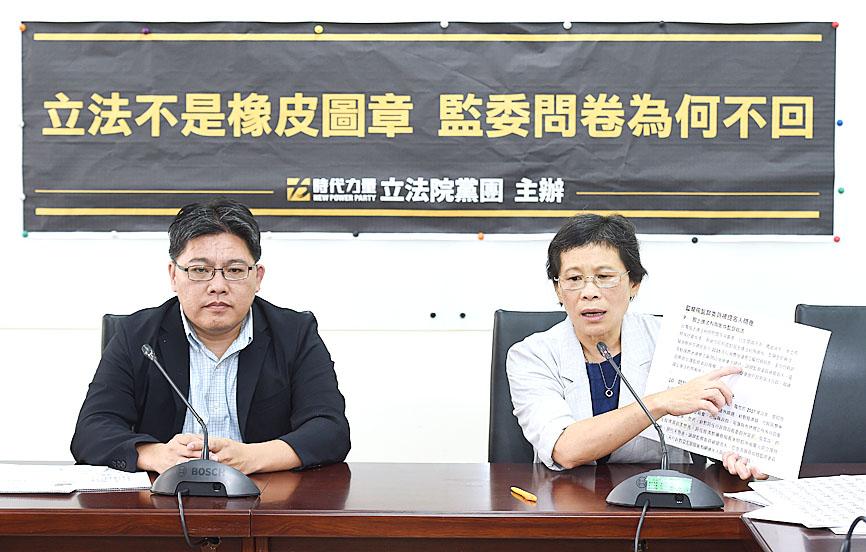The New Power Party (NPP) yesterday expressed regret after questions it posed to President Tsai Ing-wen’s (蔡英文) nominees for the Control Yuan went unanswered.
The legislature is expected to vote on Friday on whether to approve the nominations.
The NPP said it had sent questions to the nominees via the Presidential Office and sought a reply by Thursday last week, but as of yesterday it still had not received a response.

Photo: Liao Chen-huei, Taipei Times
“Does the Democratic Progressive Party [DPP] feel no obligation to respond given that it has a legislative majority?” NPP caucus whip Chiu Hsien-chih (邱顯智) asked.
The NPP would see how the nominees respond to questions on Friday before deciding whether to back their appointments, Chiu said.
Some who have been nominated for a second time had answered questions prior to their first appointment, but not this time, NPP Legislator Chen Jiau-hua (陳椒華) said.
One of the questions asked the nominees if they believe that Control Yuan members should be able to investigate cases that have already been decided by the courts, while another asked if they support the abolition of the Control Yuan or a reduction in the number of its members, Chen said.
The NPP hopes that the nominees, if appointed, would tackle the issue of illegal factories on farmland and hills, Chen said, adding that such factories should be dismantled and government bodies in charge of the issue strictly supervised.
In a case involving improperly issued mining permits for Asia Cement Corp, the Control Yuan failed to take action against officials from the Ministry of Economic Affairs and Hualien County’s Sioulin Township (秀林) Office, despite accusations against them.
Meanwhile, the legislature yesterday invited academics to speak at a public hearing on the nominees, including former grand justice Hsu Yu-hsiu (許玉秀), who was recommended by the NPP; professor Lin Chao-chun (林超駿), who was recommended by the Taiwan People’s Party; professors Hsieh Chen-yu (謝政諭) and Lin Teng-yao (林騰鷂), and lawyer Chang Chun-lun (張鈞綸), who were recommended by the Chinese Nationalist Party (KMT); and professor Yang Chia-ling (楊佳羚), associate professors Liu Chao-lung (劉兆隆) and Chou Chung-hsien (周忠憲), and Covenants Watch chief executive officer Huang Yi-bee (黃怡碧), who were recommended by the DPP.
A supervisory committee of eight members from each caucus attended the hearing, but KMT Legislator Charles Chen (陳以信) was the only committee member present when Lin Teng-yao was making his comment, prompting the latter to accuse the legislature of “treating academics like monkeys and playing with them.”
Deputy Legislative Speaker Tsai Chi-chang (蔡其昌), who presided over the hearing, said that the hearing was being broadcast online and that it could be watched from anywhere in Taiwan.
Hsu said that a delay of discussions over judicial reform until after the hearing was taking the steam out of the movement.
Control Yuan members “should be braver” in the face of the conflict between judicial and supervisory authorities, Hsu said.
Hsieh said that the 27 nominees were underqualified.
None of them had studied public policy and only five had legal backgrounds, Hsieh said.
The nominees were “unbalanced and overly favored social benefits and social movements,” he said, adding that they were politically biased toward the DPP.

A preclearance service to facilitate entry for people traveling to select airports in Japan would be available from Thursday next week to Feb. 25 at Taiwan Taoyuan International Airport, Taoyuan International Airport Corp (TIAC) said on Tuesday. The service was first made available to Taiwanese travelers throughout the winter vacation of 2024 and during the Lunar New Year holiday. In addition to flights to the Japanese cities of Hakodate, Asahikawa, Akita, Sendai, Niigata, Okayama, Takamatsu, Kumamoto and Kagoshima, the service would be available to travelers to Kobe and Oita. The service can be accessed by passengers of 15 flight routes operated by

Chinese spouse and influencer Guan Guan’s (關關) residency permit has been revoked for repeatedly posting pro-China videos that threaten national security, the National Immigration Agency confirmed today. Guan Guan has said many controversial statements in her videos posted to Douyin (抖音), including “the red flag will soon be painted all over Taiwan” and “Taiwan is an inseparable part of China,” and expressing hope for expedited reunification. The agency last year received multiple reports alleging that Guan Guan had advocated for armed reunification. After verifying the reports, the agency last month issued a notice requiring her to appear and explain her actions. Guan

GIVE AND TAKE: Blood demand continues to rise each year, while fewer young donors are available due to the nation’s falling birthrate, a doctor said Blood donors can redeem points earned from donations to obtain limited edition Formosan black bear travel mugs, the Kaohsiung Blood Center said yesterday, as it announced a goal of stocking 20,000 units of blood prior to the Lunar New Year. The last month of the lunar year is National Blood Donation Month, when local centers seek to stockpile blood for use during the Lunar New Year holiday. The blood demand in southern Taiwan — including Tainan and Kaohsiung, as well as Chiayi, Pingtung, Penghu and Taitung counties — is about 2,000 units per day, the center said. The donation campaign aims to boost

The Central Weather Administration (CWA) said a magnitude 4.9 earthquake that struck off the coast of eastern Taiwan yesterday was an independent event and part of a stress-adjustment process. The earthquake occurred at 4:47pm, with its epicenter at sea about 45.4km south of Yilan County Hall at a depth of 5.9km, the CWA said. The quake's intensity, which gauges the actual effects of a temblor, was highest in several townships in Yilan and neighboring Hualien County, where it measured 4 on Taiwan's seven-tier intensity scale, the CWA said. Lin Po-yu (林柏佑), a division chief at the CWA's Seismological Center, told a news conference